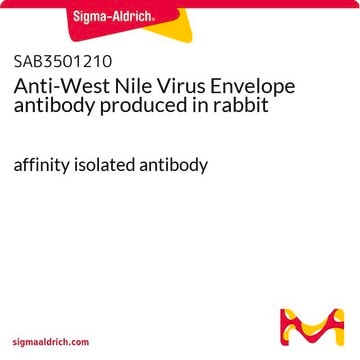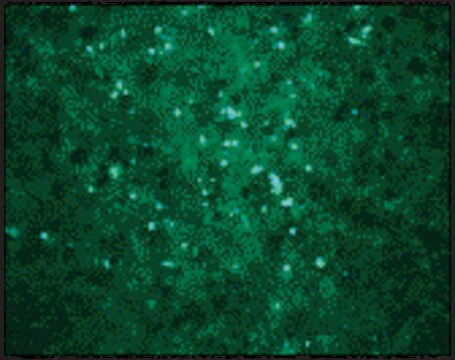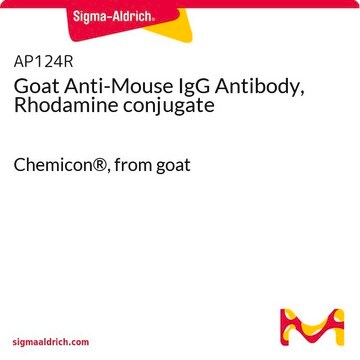MAB8150
Anti-West Nile Virus/Kunjin Antibody, Envelope, clone 3.67G
clone 3.67G, Chemicon®, from mouse
Sign Into View Organizational & Contract Pricing
All Photos(1)
About This Item
UNSPSC Code:
12352203
eCl@ss:
32160702
NACRES:
NA.41
clone:
3.67G, monoclonal
application:
ELISA
IF
IHC
WB
IF
IHC
WB
species reactivity:
human
technique(s):
ELISA: suitable
immunofluorescence: suitable
immunohistochemistry: suitable
western blot: suitable
immunofluorescence: suitable
immunohistochemistry: suitable
western blot: suitable
citations:
10
Recommended Products
biological source
mouse
Quality Level
antibody form
purified immunoglobulin
antibody product type
primary antibodies
clone
3.67G, monoclonal
species reactivity
human
manufacturer/tradename
Chemicon®
technique(s)
ELISA: suitable
immunofluorescence: suitable
immunohistochemistry: suitable
western blot: suitable
isotype
IgG1
shipped in
wet ice
Specificity
Specific for the major envelope protein E of West Nile/Kunjin virus. Kunjin (KUN) is very closely related to some strains of West Nile virus, and has been classified as a subtype of West Nile.
Immunogen
Epitope: Envelope
Application
Anti-West Nile Virus/Kunjin Antibody, Envelope, clone 3.67G detects level of West Nile Virus/Kunjin & has been published & validated for use in ELISA, IF, WB, IH.
Physical form
Format: Purified
Purified immunoglobulin in 0.02 M phosphate buffer, 0.25M NaCl, pH 7.6 with 0.1% Sodium Azide.
Storage and Stability
Maintain at 2-8°C in undiluted aliquots.
Other Notes
Concentration: Please refer to the Certificate of Analysis for the lot-specific concentration.
Legal Information
CHEMICON is a registered trademark of Merck KGaA, Darmstadt, Germany
Not finding the right product?
Try our Product Selector Tool.
Storage Class Code
10 - Combustible liquids
WGK
WGK 2
Flash Point(F)
Not applicable
Flash Point(C)
Not applicable
Certificates of Analysis (COA)
Search for Certificates of Analysis (COA) by entering the products Lot/Batch Number. Lot and Batch Numbers can be found on a product’s label following the words ‘Lot’ or ‘Batch’.
Already Own This Product?
Find documentation for the products that you have recently purchased in the Document Library.
Miguel A Martín-Acebes et al.
Journal of lipid research, 57(3), 422-432 (2016-01-15)
Flaviviruses, such as the dengue virus and the West Nile virus (WNV), are arthropod-borne viruses that represent a global health problem. The flavivirus lifecycle is intimately connected to cellular lipids. Among the lipids co-opted by flaviviruses, we have focused on
Himanshu Garg et al.
Journal of virology, 91(20) (2017-08-11)
Recent worldwide outbreaks of Zika virus (ZIKV) infection and the lack of an approved vaccine raise serious concerns regarding preparedness to combat this emerging virus. We used a virus-like particle (VLP)-based approach to develop a vaccine and a microneutralization assay
Ana B Blázquez et al.
Frontiers in microbiology, 7, 296-296 (2016-03-26)
West Nile virus (WNV) is a mosquito-borne flavivirus maintained in a transmission cycle between mosquitoes and birds, but it can also infect other vertebrates, including humans, in which it can cause neuroinvasive diseases. To date, no licensed vaccine or therapy
A recombinant novirhabdovirus presenting at the surface the E Glycoprotein from West Nile Virus (WNV) is immunogenic and provides partial protection against lethal WNV challenge in BALB/c mice.
Nzonza, A; Lecollinet, S; Chat, S; Lowenski, S; Merour, E; Biacchesi, S; Bremont, M
Testing null
Ana B Blázquez et al.
Viruses, 10(2) (2018-02-24)
Flaviviruses are relevant animal and human pathogens that include West Nile virus (WNV), Japanese encephalitis virus, dengue virus, or Zika virus, among others. Currently, no licensed therapy is available to fight flaviviral infections. Protein kinases C (PKCs) constitute a family
Our team of scientists has experience in all areas of research including Life Science, Material Science, Chemical Synthesis, Chromatography, Analytical and many others.
Contact Technical Service








